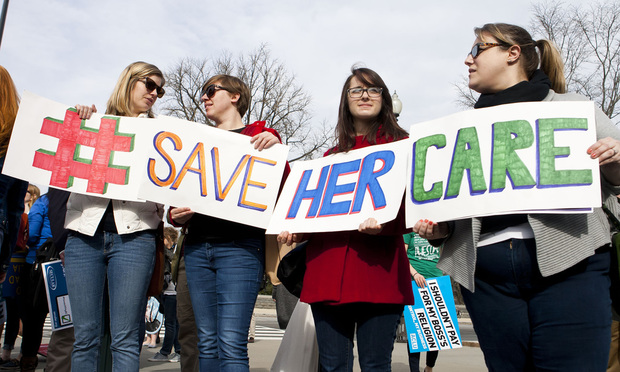Third Circuit Upholds Nationwide Injunction Barring Trump Administration's Exceptions to ACA's Birth Control Mandate
A unanimous three-judge panel of the U.S. Court of Appeals for the Third Circuit ruled July 12 to uphold a decision from January that barred the federal government from enforcing a version of the ACA that allowed for greatly expanded exceptions to the requirement that companies help cover the cost of contraceptives.
July 15, 2019 at 02:11 PM
5 minute read
 Demonstrators outside the U.S. Supreme Court on March 23, 2016, the day of arguments in the case Zubik v. Burwell, which challenges the Health and Human Services Contraception Mandate on behalf of religious nonprofit organizations. Photo: Diego M. Radzinschi/ALM
Demonstrators outside the U.S. Supreme Court on March 23, 2016, the day of arguments in the case Zubik v. Burwell, which challenges the Health and Human Services Contraception Mandate on behalf of religious nonprofit organizations. Photo: Diego M. Radzinschi/ALM
A federal appeals court has upheld a nationwide injunction that blocked the Trump administration from enacting certain religious and moral exceptions to the Affordable Care Act that have been widely seen as a means to roll back the mandate for covering birth control medications.
A unanimous three-judge panel of the U.S. Court of Appeals for the Third Circuit ruled July 12 to uphold a decision from January that barred the federal government from enforcing a version of the ACA that allowed for greatly expanded exceptions to the requirement that companies help cover the cost of contraceptives.
The ruling is a win for Pennsylvania and New Jersey, which are seeking to halt the proposed changes that, the states argued, would have resulted in the states picking up the bill for thousands of women whose coverage, the states contend, would be dropped as a result of the changes.
Led by Judge Patty Shwartz, the panel determined that, since the states were likely to succeed with their arguments, a nationwide injunction was appropriate to halt any harm the states or women may suffer.
“Because the current accommodation does not substantially burden employers' religious exercise and the exemption is not necessary to protect a legally-cognizable interest, the states' financial injury outweighs any purported injury to religious exercise,” Shwartz said. “Moreover, the public interest favors minimizing harm to third-parties by ensuring that women who may lose ACA guaranteed contraceptive coverage are able to maintain access to the preventive care to which they are entitled under the ACA and [Health Resources and Services Administration]'s comprehensive guidelines while final adjudication of the rules is pending.”
In a statement to the press, Pennsylvania Attorney General Josh Shapiro called the ruling a “big win.”
“Contraception is medicine—pure and simple. Today's decision by the Third Circuit Court of Appeals to uphold my office's nationwide injunction is a win for the women of this nation,” Shapiro said. “This is a huge victory for women's rights and the rule of law—two things the Trump administration has disregarded from day one. Pennsylvania women can be confident I will continue to fight for their right to health coverage and contraceptive care.”
New Jersey Attorney General Gurbir Grewal offered similar sentiments.
“The rules that we just defeated would deny basic health care to tens of thousands of women across the country,” Grewal said. “We will keep fighting for equal and affordable health care for people in New Jersey and across the country, and are proud to have Pennsylvania Attorney General Josh Shapiro as a partner in that fight.”
In a press statement, a spokeswoman for the U.S. Department of Justice said, “We are disappointed by this decision. Religious organizations should not be forced to violate their mission and deeply-held beliefs. The Department of Justice continues to vigorously defend religious liberty.”
Along with arguments about the alleged harm, much of Shwartz's 56-page decision focused on allegations that the government did not follow the proper notice and comment rule-making process.
The Trump administration had argued it had been able to circumvent the usual comment period in part because of the religious harm those objecting to the mandate might face. The Third Circuit, however, said objectors could still litigate individual accommodations regarding the contraceptive mandate, and that the changes the Trump administration sought were “such a dramatic overhaul” of the rules, they needed to go through the normal process.
The panel also looked into the lower court's decision to impose a nationwide injunction in the matter. Nationwide injunctions, which bar a given practice from coast to coast, have come under increasing scrutiny recently, with some critics saying the rulings affect those beyond the district court's jurisdictions and others contending that the wide-ranging rulings stymie a rigorous development of the law, since only one judge, or one circuit, can weigh the issue.
The Third Circuit panel, however said the nationwide injunction U.S. District Judge Wendy Beetlestone of the Eastern District of Pennsylvania issued in January was appropriate given how so many people work, or attend schools, in states where they do not live.
“An injunction geographically limited to the states alone will not protect them from financial harm, as some share of their residents who work out-of-state will lose contraceptive coverage originally provided through employers in non-enjoined states who will exempt themselves,” Shwartz said. “In light of the impact of these interstate activities, the district court did not abuse its discretion in concluding that a nationwide injunction was necessary to afford the states complete relief.”
This content has been archived. It is available through our partners, LexisNexis® and Bloomberg Law.
To view this content, please continue to their sites.
Not a Lexis Subscriber?
Subscribe Now
Not a Bloomberg Law Subscriber?
Subscribe Now
NOT FOR REPRINT
© 2025 ALM Global, LLC, All Rights Reserved. Request academic re-use from www.copyright.com. All other uses, submit a request to [email protected]. For more information visit Asset & Logo Licensing.
You Might Like
View All
Superior Court Rejects Pa. Hospital's Challenge to $7.3M Med Mal Judgment
3 minute read
Longtime Reed Smith Health Care Partner Opts for Solo Practice Over Retirement
3 minute read
Pa. Appeals Court: Trial Judge Dismissed Med Mal Claims Without Giving Plaintiffs Proper Time to Fight Back
4 minute read
Pa. Hospital Agrees to $16M Settlement Following High Schooler's Improper Discharge
4 minute readTrending Stories
- 1Lavish 'Lies' Led to Investors Being Fleeced in Nine-Figure International Crypto Scam
- 2AstraZeneca Files Flurry of Lawsuits to Protect Cancer Treatment Drug
- 3American Airlines Legal Chief Departs for Warner Bros. Discovery
- 4New Montgomery Bar President Aims to Boost Lawyer Referral Service
- 5Deadline Extended for Southeastern Legal Awards
Who Got The Work
Michael G. Bongiorno, Andrew Scott Dulberg and Elizabeth E. Driscoll from Wilmer Cutler Pickering Hale and Dorr have stepped in to represent Symbotic Inc., an A.I.-enabled technology platform that focuses on increasing supply chain efficiency, and other defendants in a pending shareholder derivative lawsuit. The case, filed Oct. 2 in Massachusetts District Court by the Brown Law Firm on behalf of Stephen Austen, accuses certain officers and directors of misleading investors in regard to Symbotic's potential for margin growth by failing to disclose that the company was not equipped to timely deploy its systems or manage expenses through project delays. The case, assigned to U.S. District Judge Nathaniel M. Gorton, is 1:24-cv-12522, Austen v. Cohen et al.
Who Got The Work
Edmund Polubinski and Marie Killmond of Davis Polk & Wardwell have entered appearances for data platform software development company MongoDB and other defendants in a pending shareholder derivative lawsuit. The action, filed Oct. 7 in New York Southern District Court by the Brown Law Firm, accuses the company's directors and/or officers of falsely expressing confidence in the company’s restructuring of its sales incentive plan and downplaying the severity of decreases in its upfront commitments. The case is 1:24-cv-07594, Roy v. Ittycheria et al.
Who Got The Work
Amy O. Bruchs and Kurt F. Ellison of Michael Best & Friedrich have entered appearances for Epic Systems Corp. in a pending employment discrimination lawsuit. The suit was filed Sept. 7 in Wisconsin Western District Court by Levine Eisberner LLC and Siri & Glimstad on behalf of a project manager who claims that he was wrongfully terminated after applying for a religious exemption to the defendant's COVID-19 vaccine mandate. The case, assigned to U.S. Magistrate Judge Anita Marie Boor, is 3:24-cv-00630, Secker, Nathan v. Epic Systems Corporation.
Who Got The Work
David X. Sullivan, Thomas J. Finn and Gregory A. Hall from McCarter & English have entered appearances for Sunrun Installation Services in a pending civil rights lawsuit. The complaint was filed Sept. 4 in Connecticut District Court by attorney Robert M. Berke on behalf of former employee George Edward Steins, who was arrested and charged with employing an unregistered home improvement salesperson. The complaint alleges that had Sunrun informed the Connecticut Department of Consumer Protection that the plaintiff's employment had ended in 2017 and that he no longer held Sunrun's home improvement contractor license, he would not have been hit with charges, which were dismissed in May 2024. The case, assigned to U.S. District Judge Jeffrey A. Meyer, is 3:24-cv-01423, Steins v. Sunrun, Inc. et al.
Who Got The Work
Greenberg Traurig shareholder Joshua L. Raskin has entered an appearance for boohoo.com UK Ltd. in a pending patent infringement lawsuit. The suit, filed Sept. 3 in Texas Eastern District Court by Rozier Hardt McDonough on behalf of Alto Dynamics, asserts five patents related to an online shopping platform. The case, assigned to U.S. District Judge Rodney Gilstrap, is 2:24-cv-00719, Alto Dynamics, LLC v. boohoo.com UK Limited.
Featured Firms
Law Offices of Gary Martin Hays & Associates, P.C.
(470) 294-1674
Law Offices of Mark E. Salomone
(857) 444-6468
Smith & Hassler
(713) 739-1250





